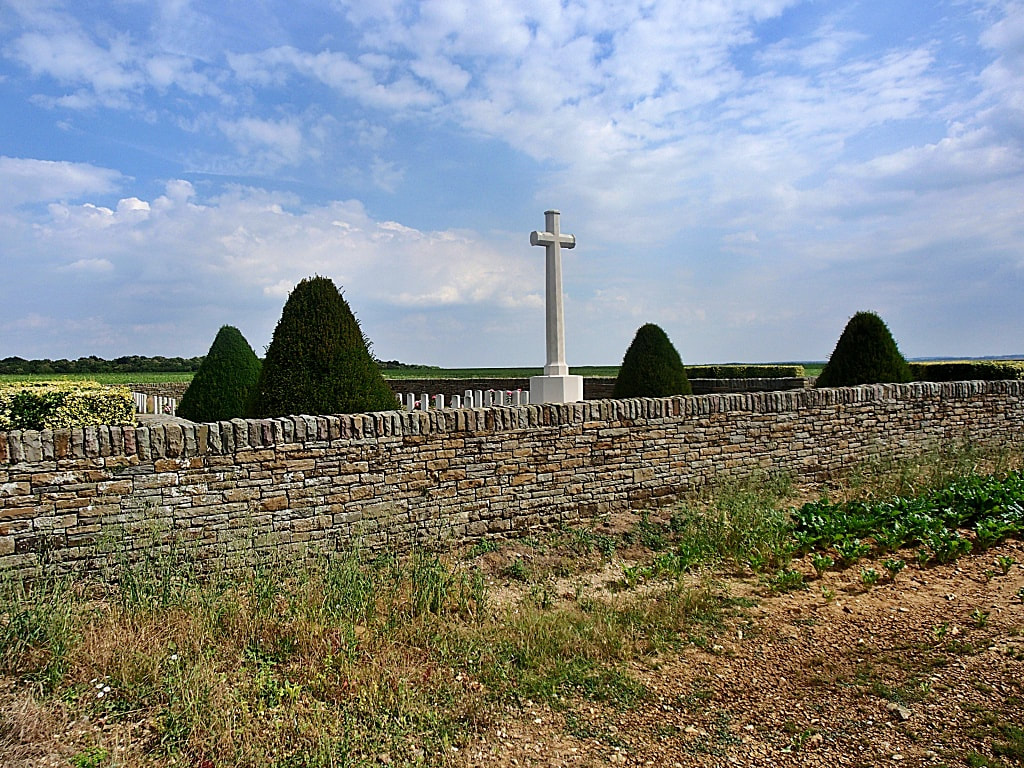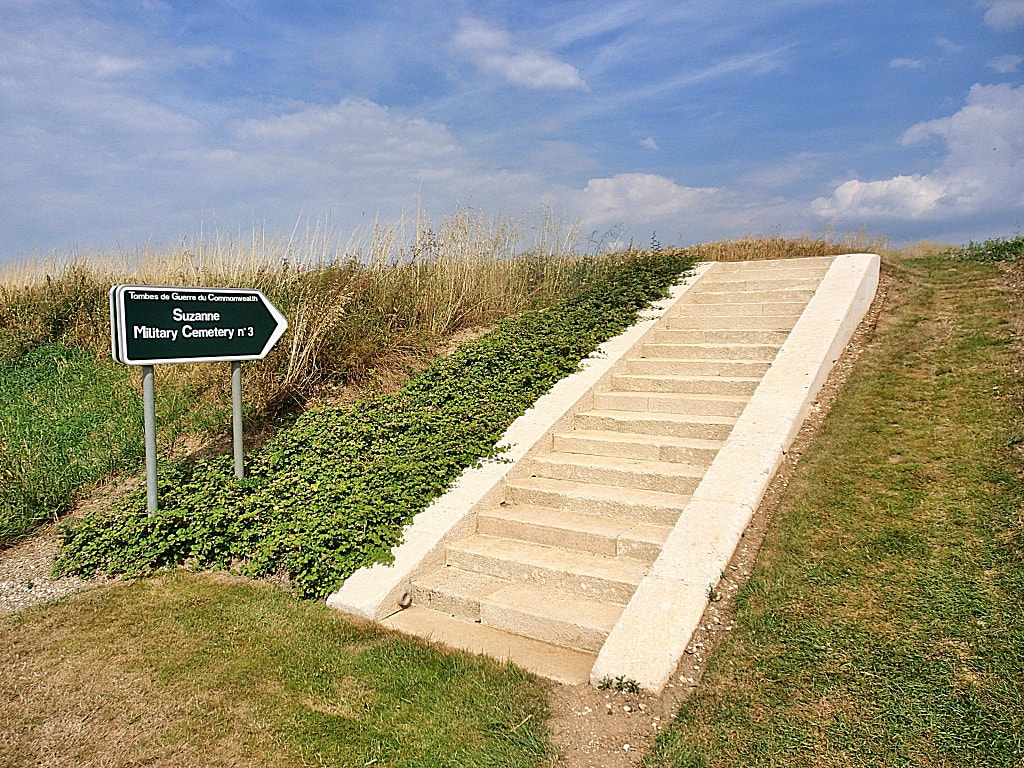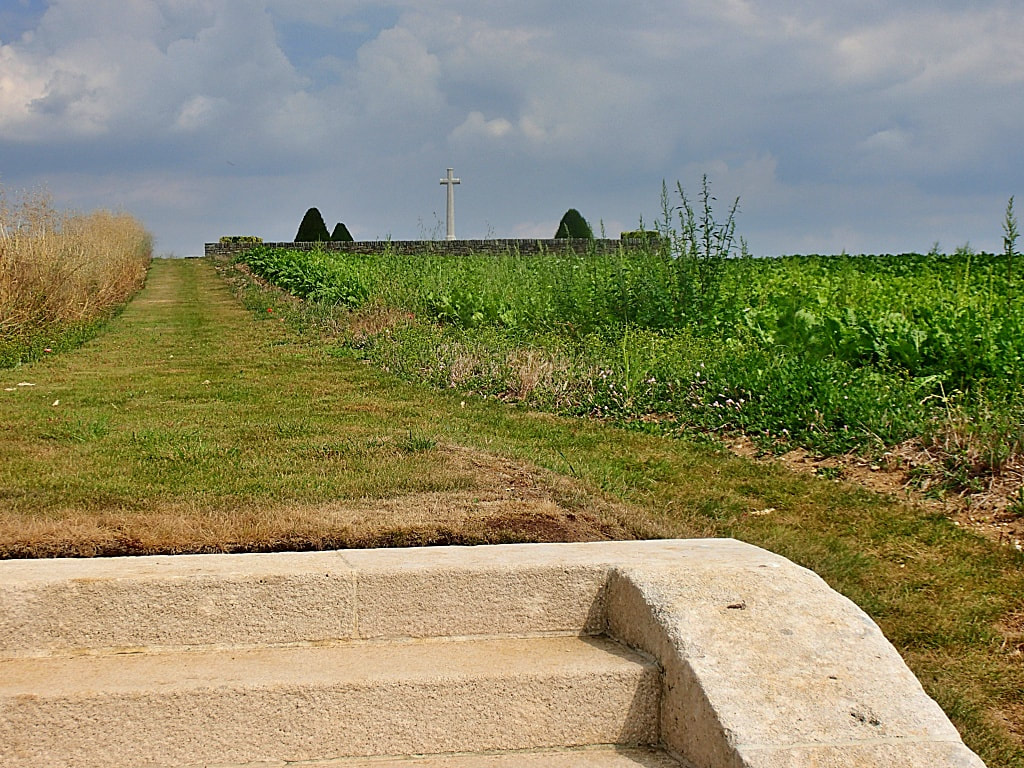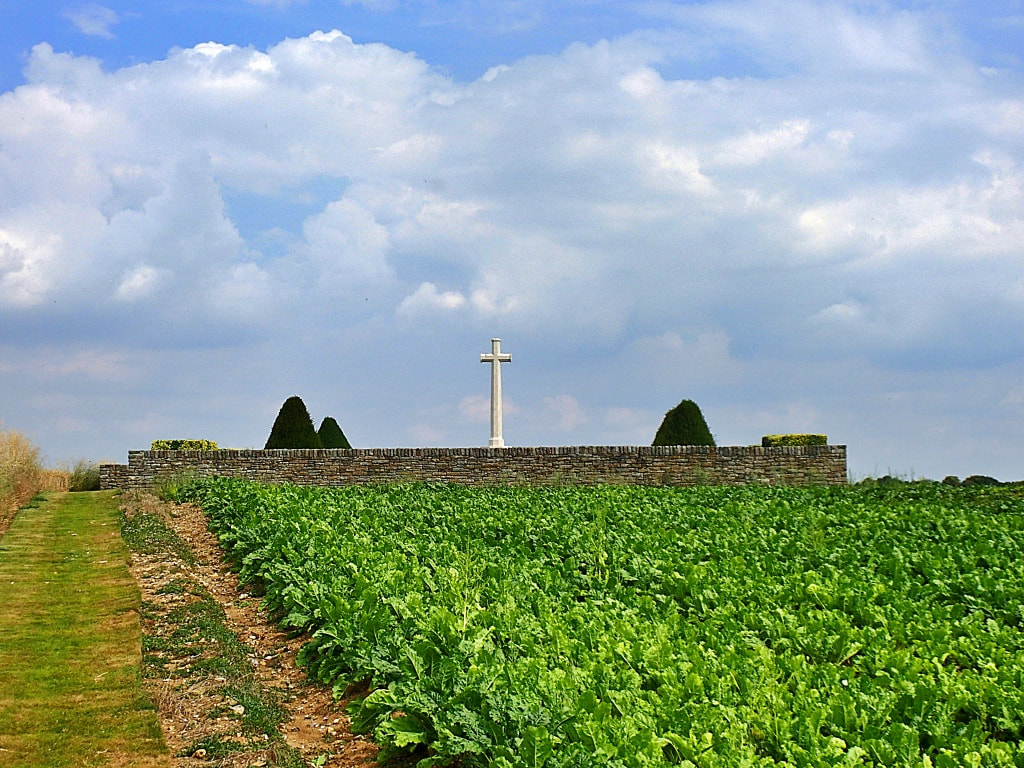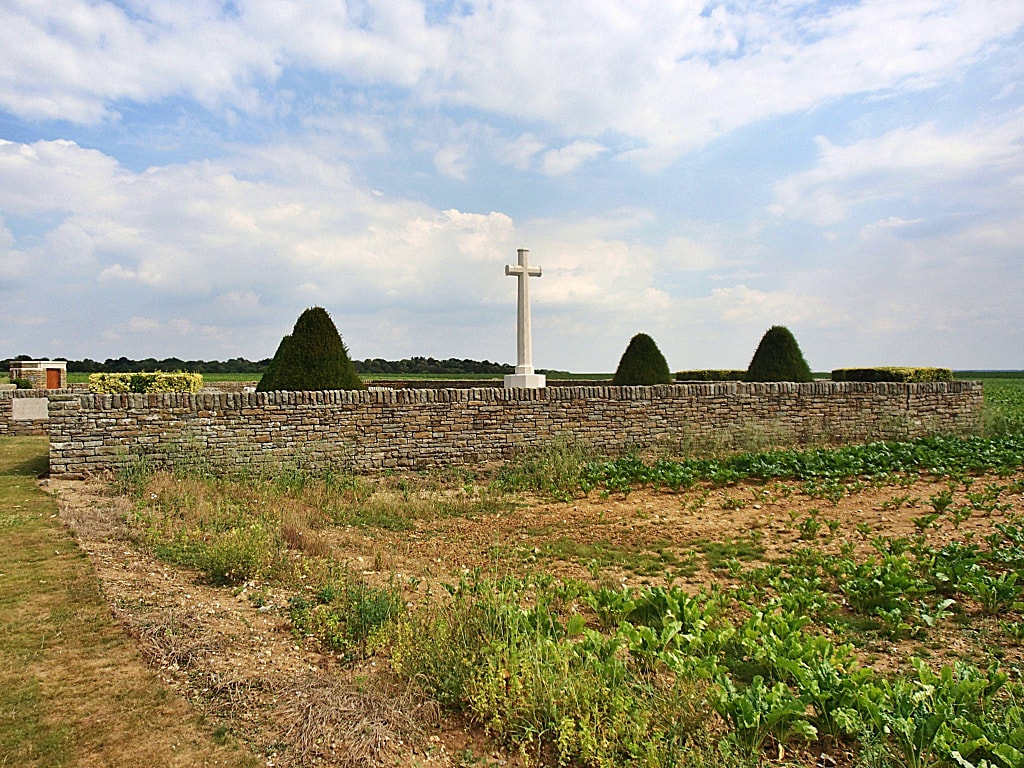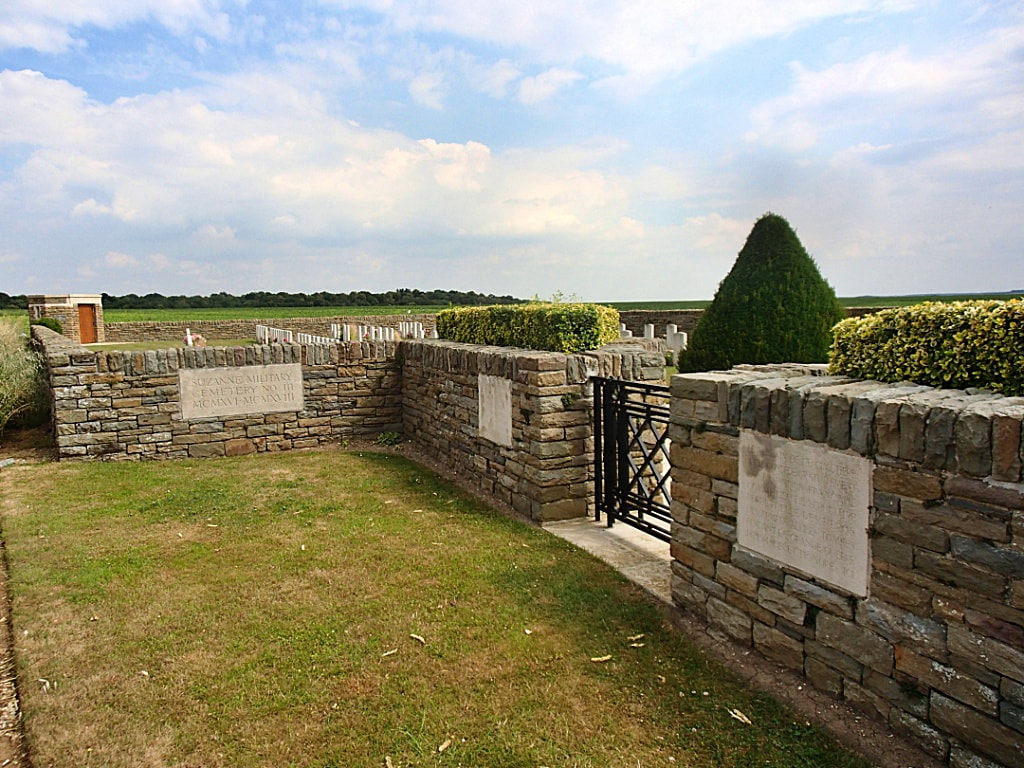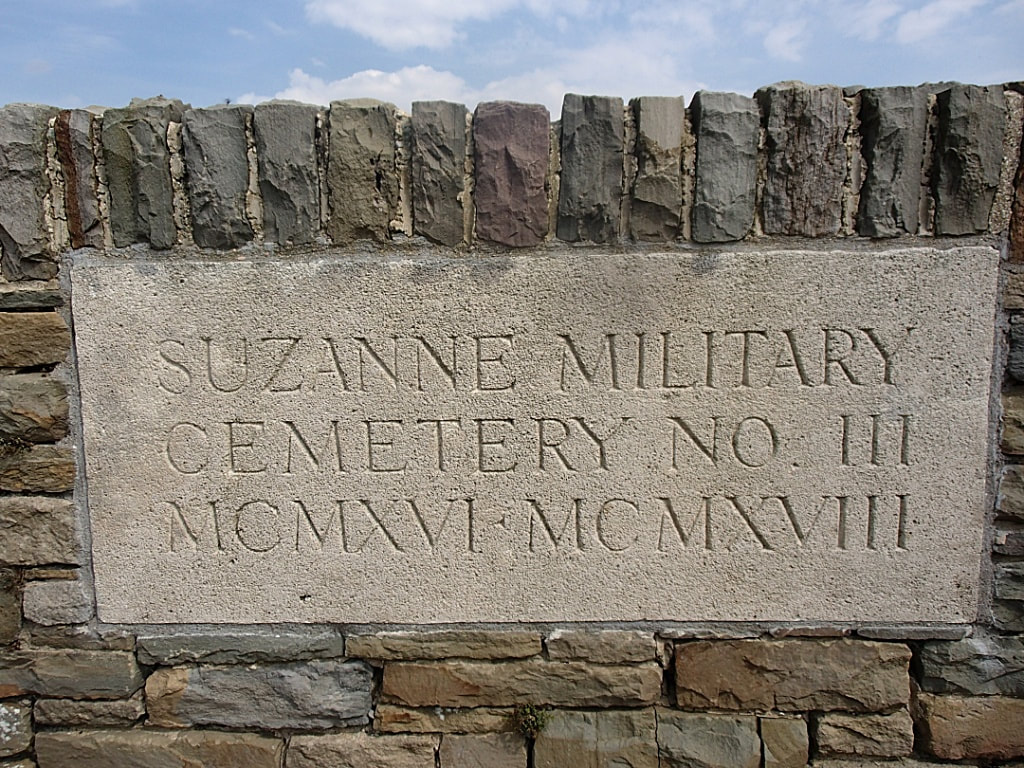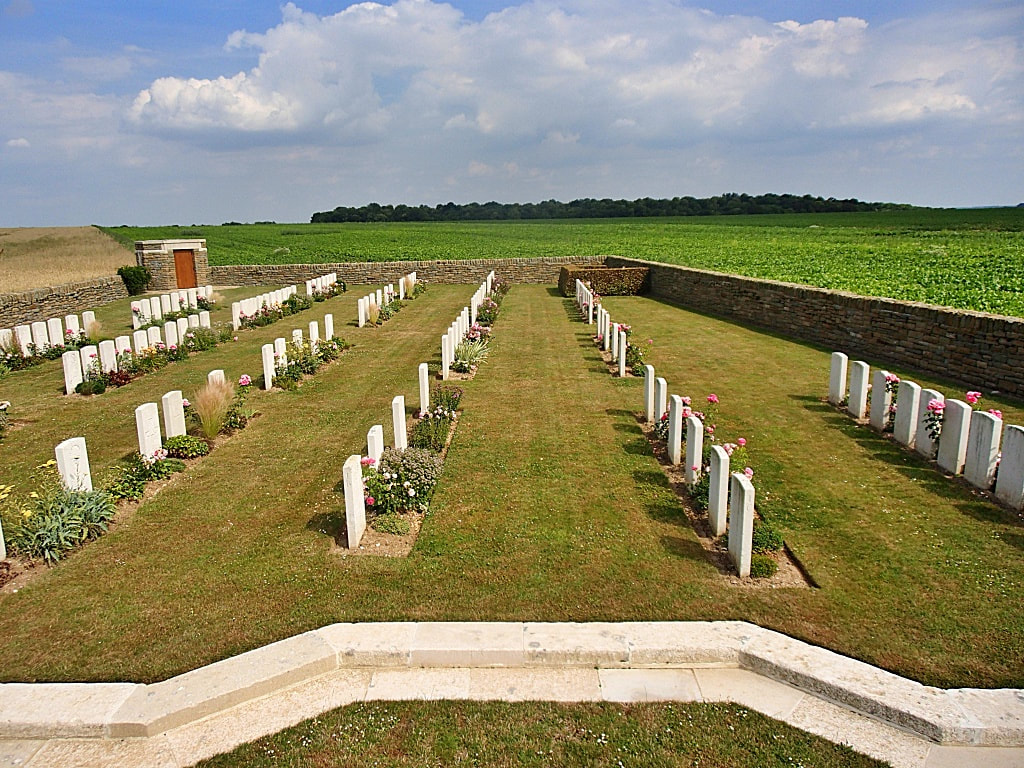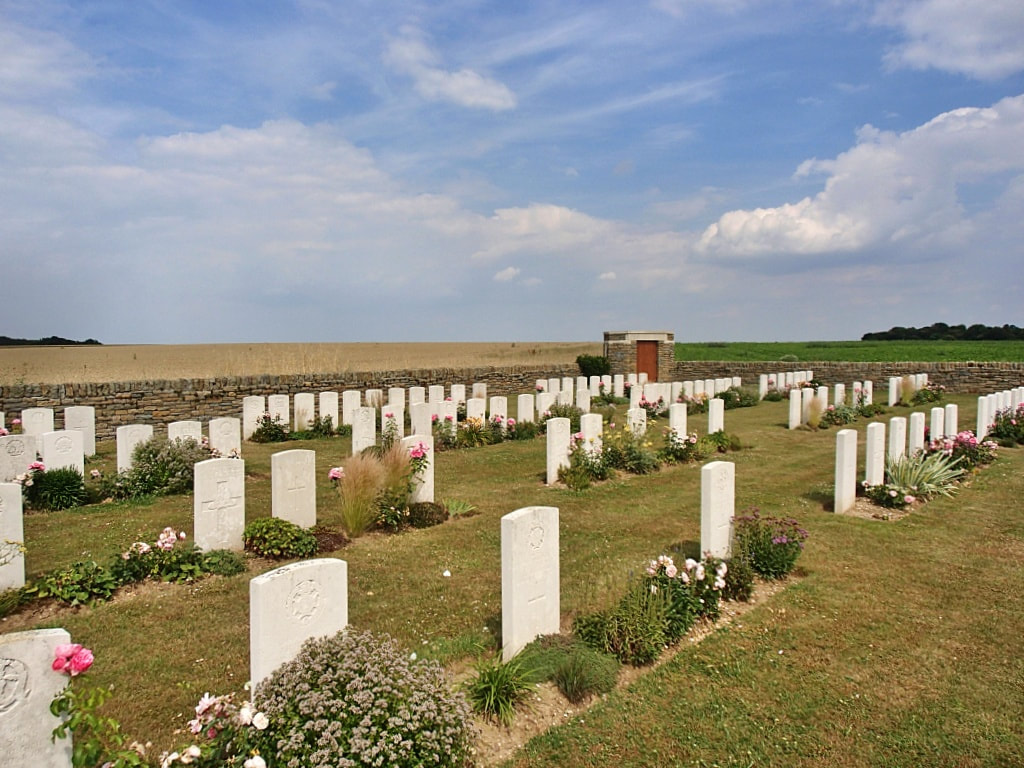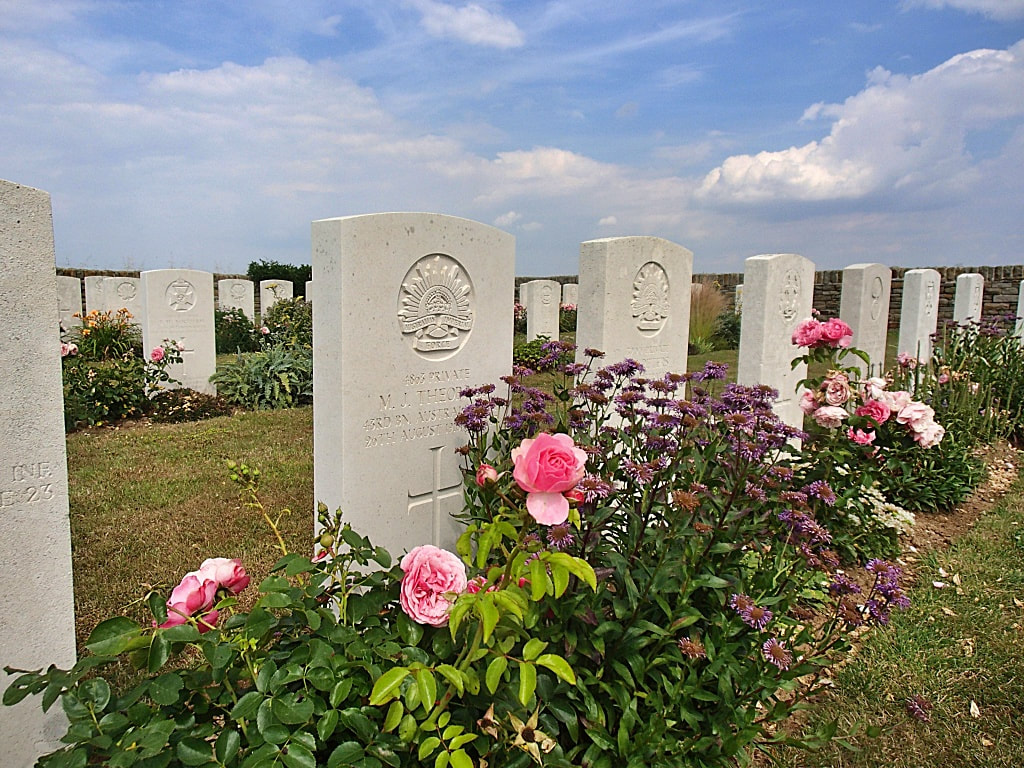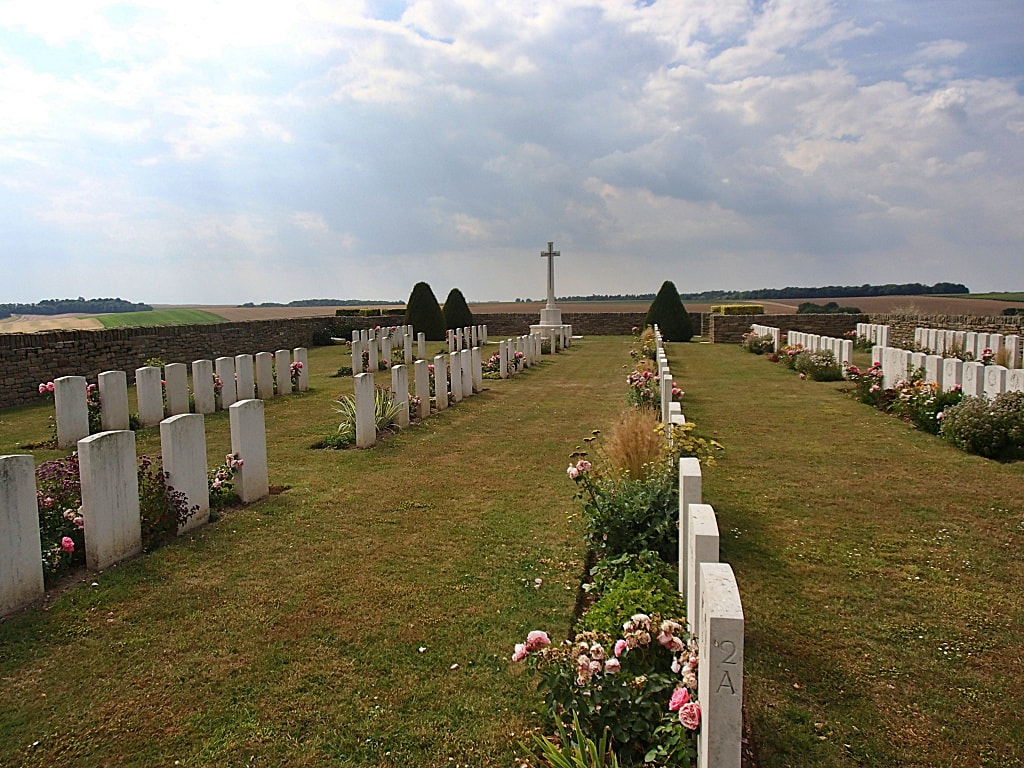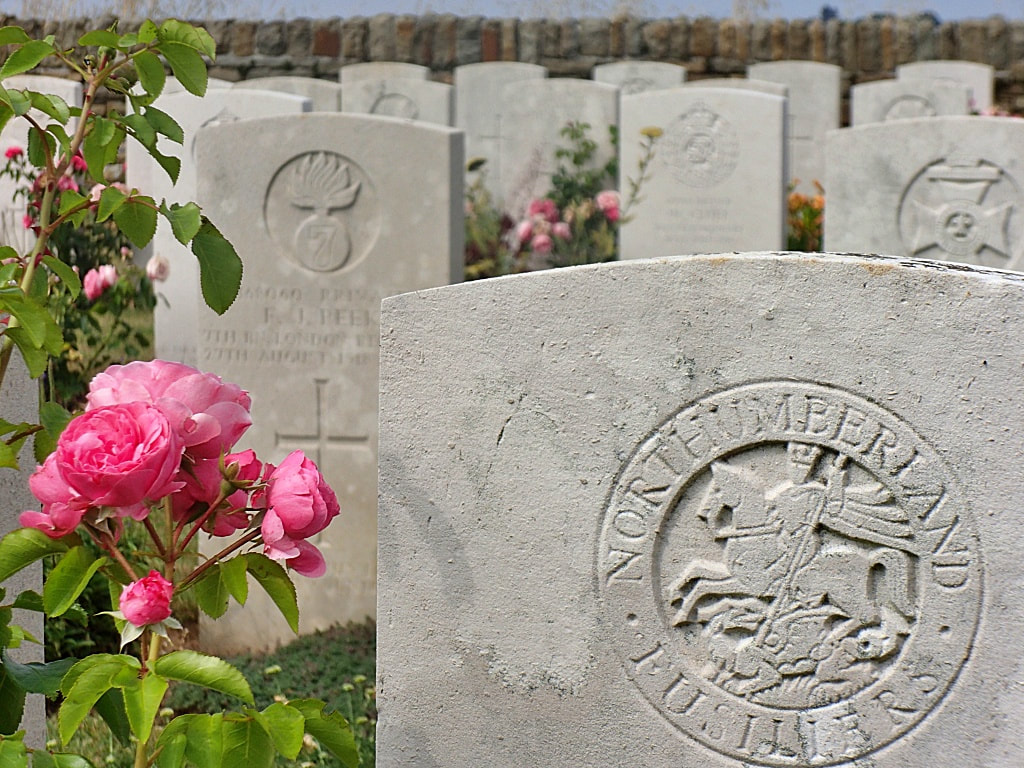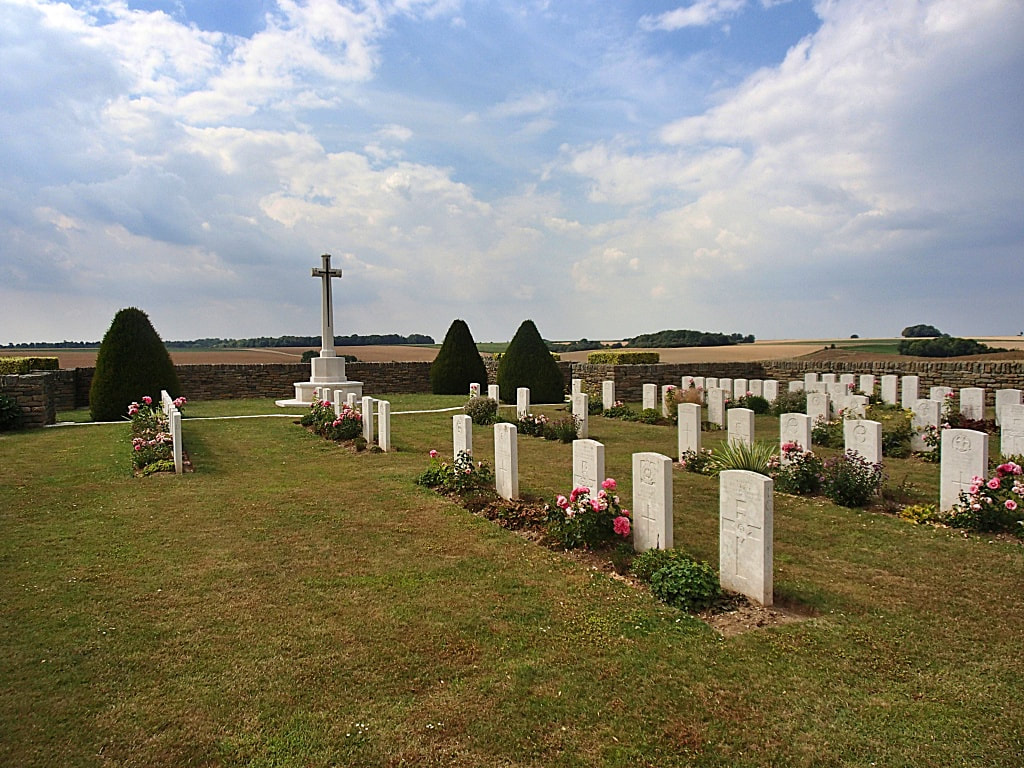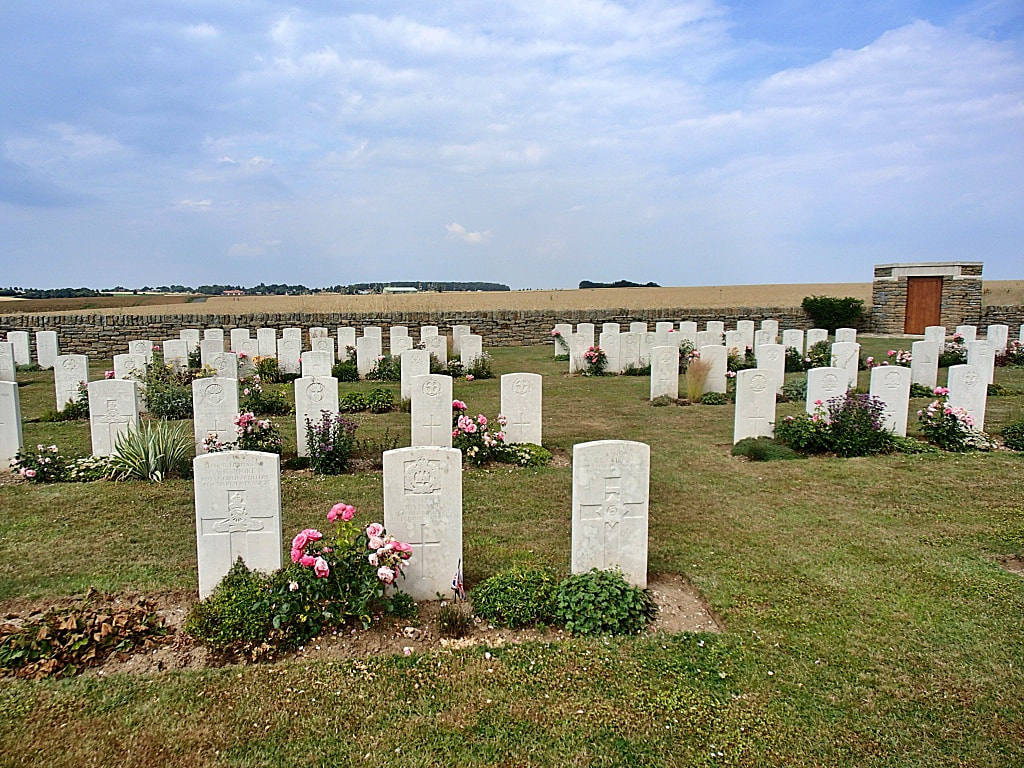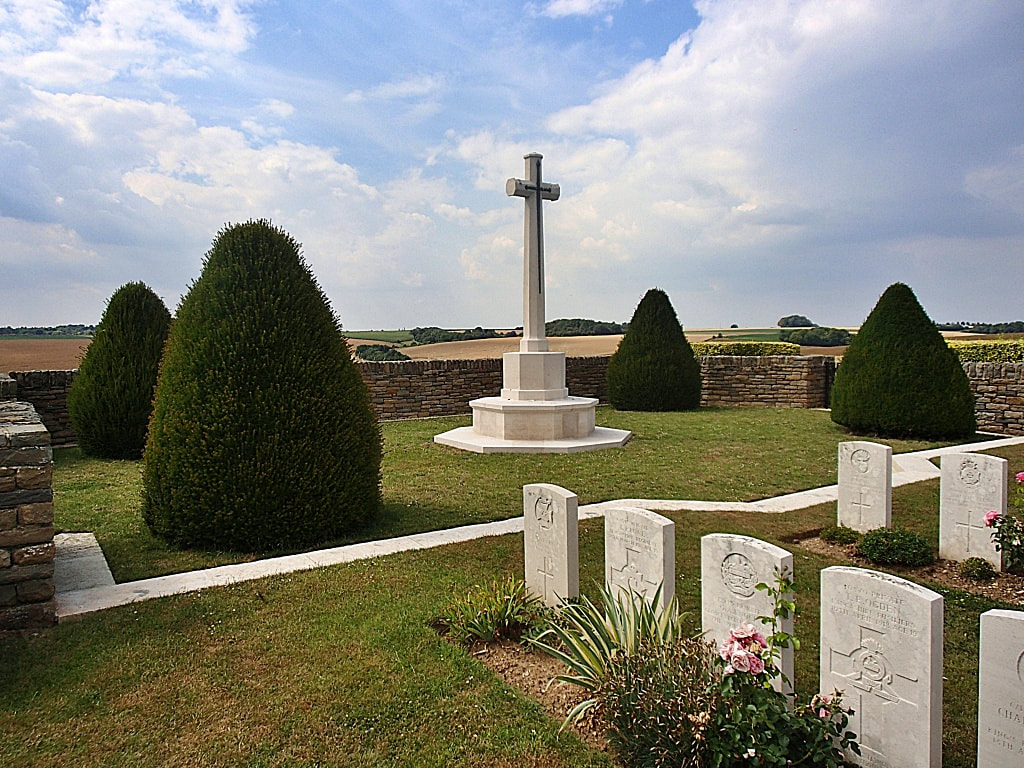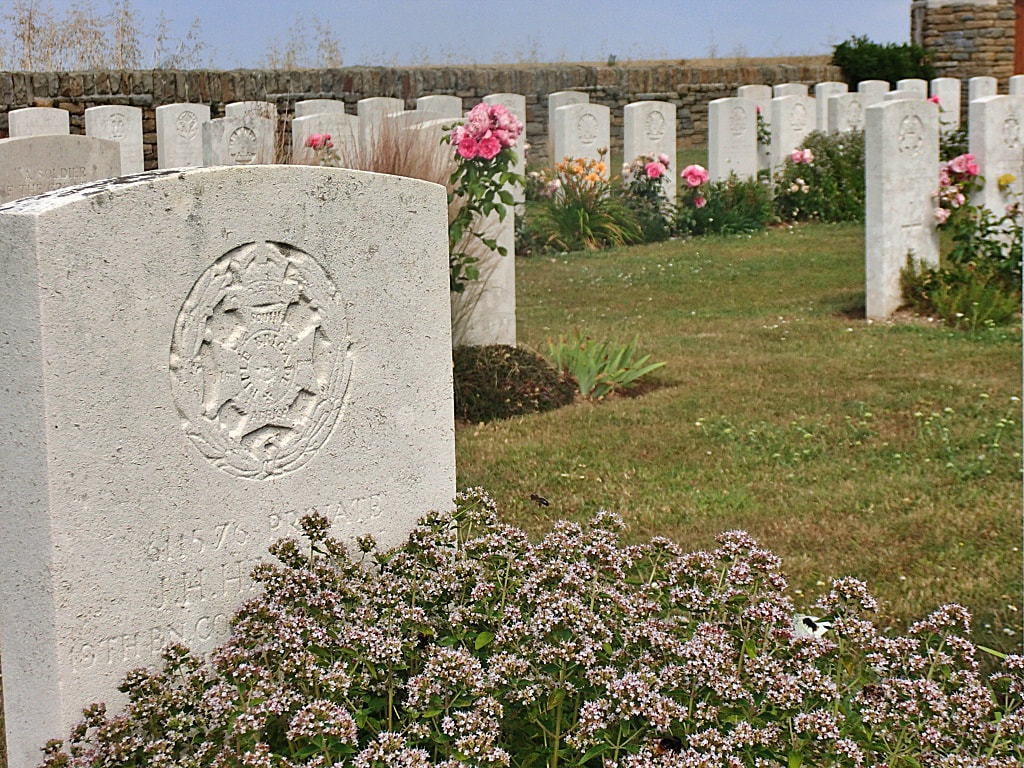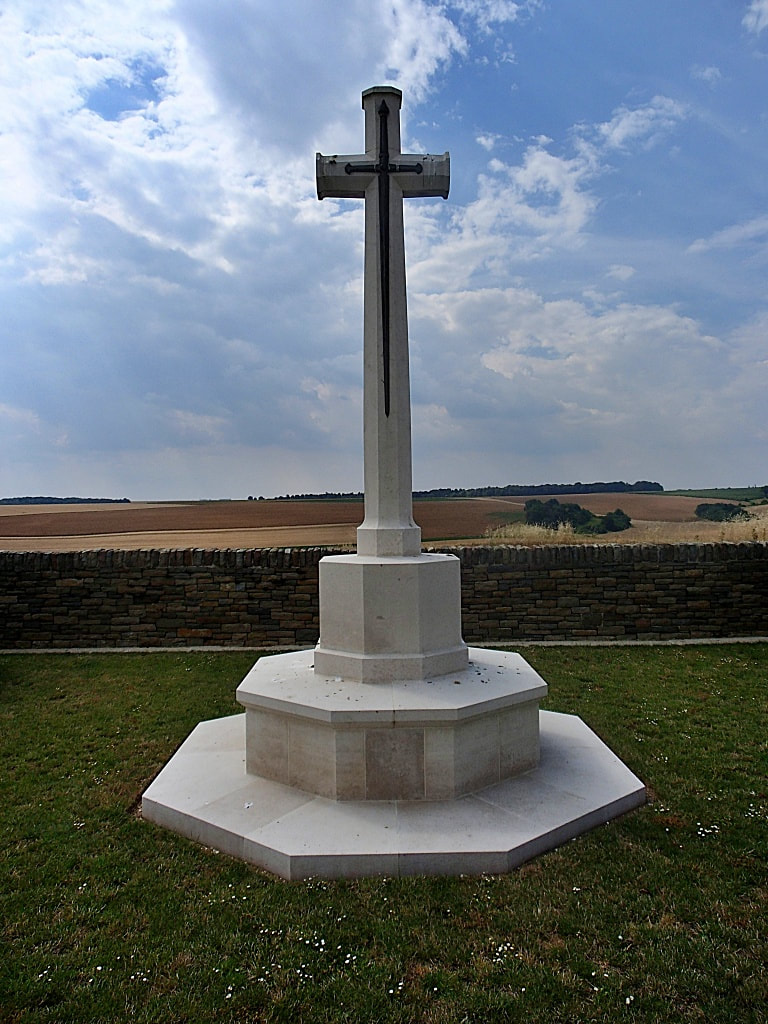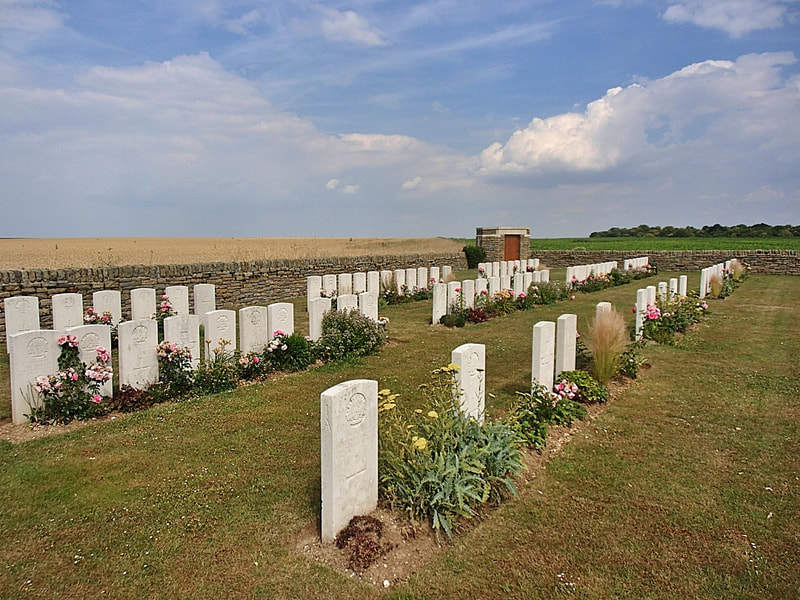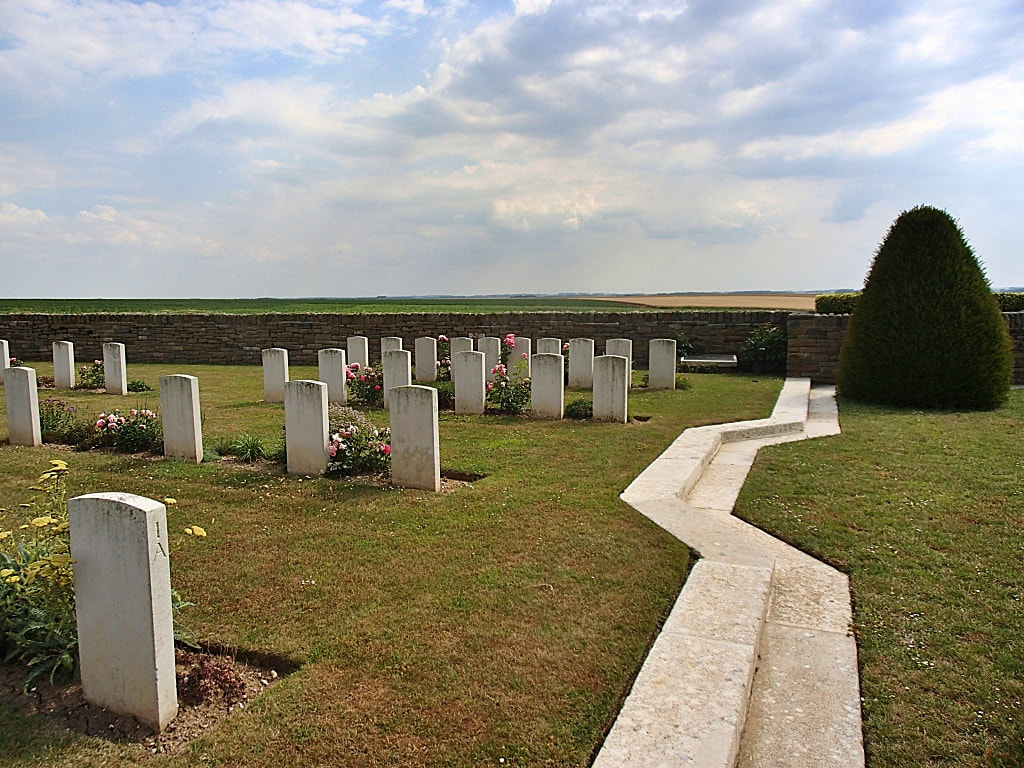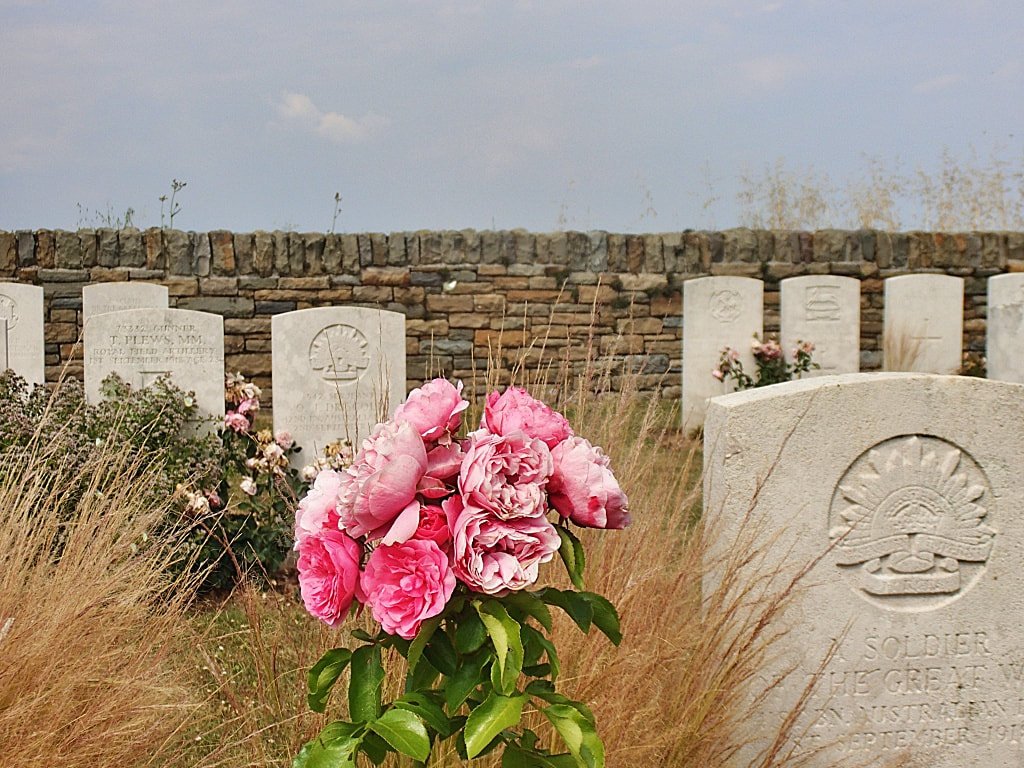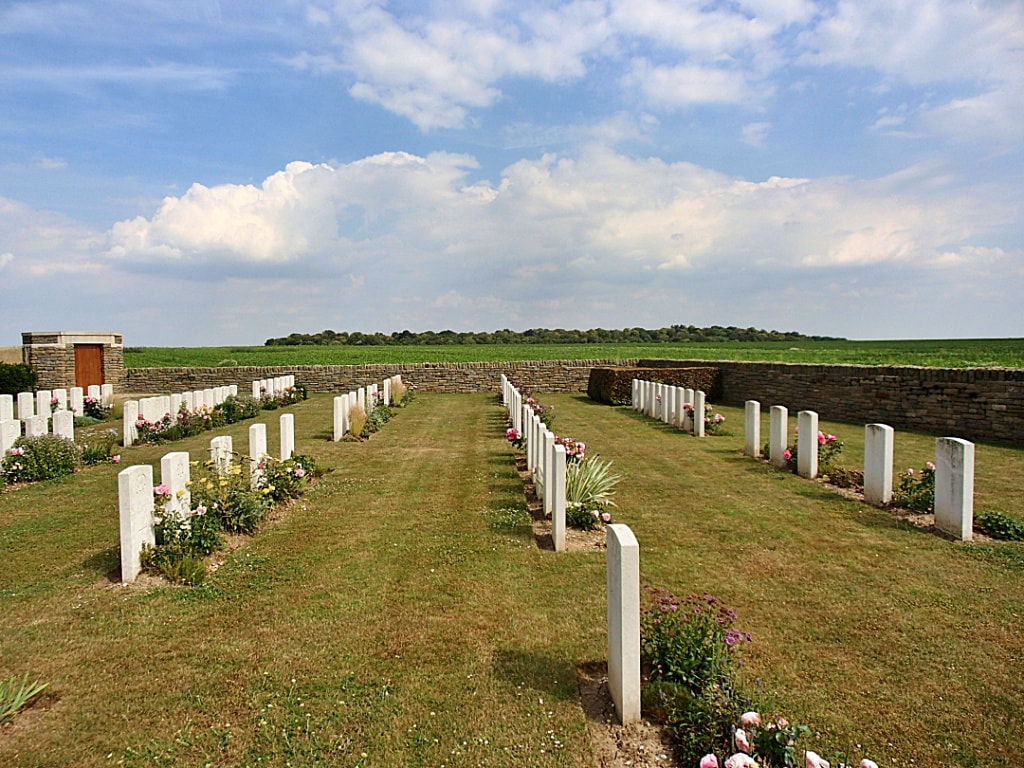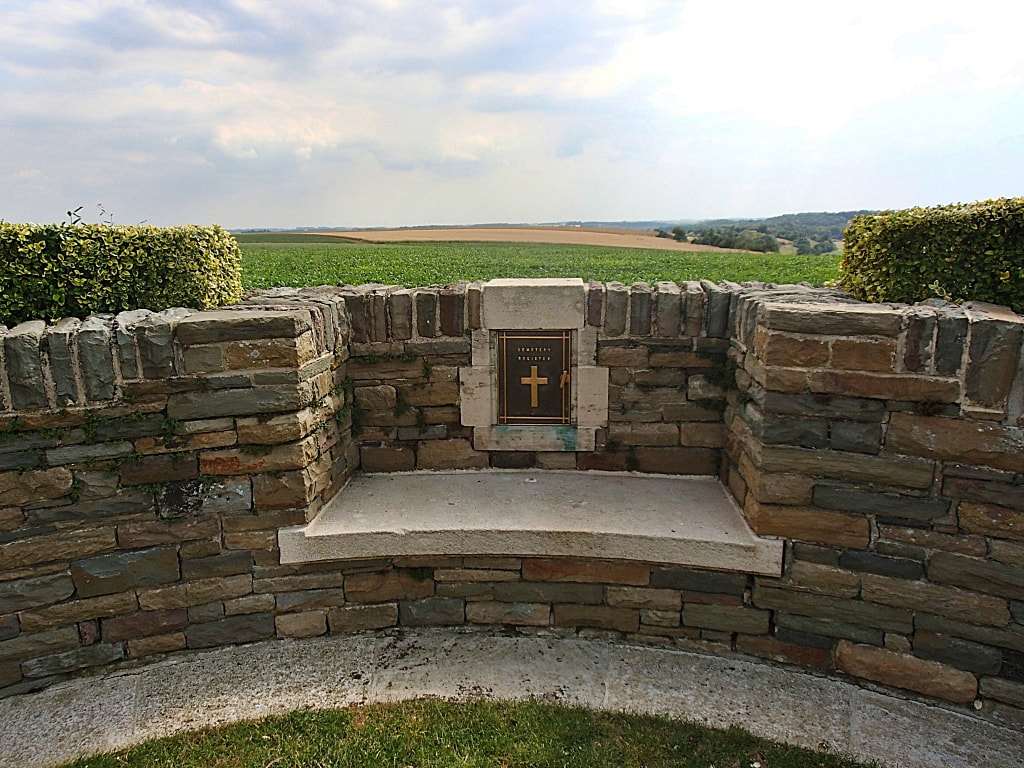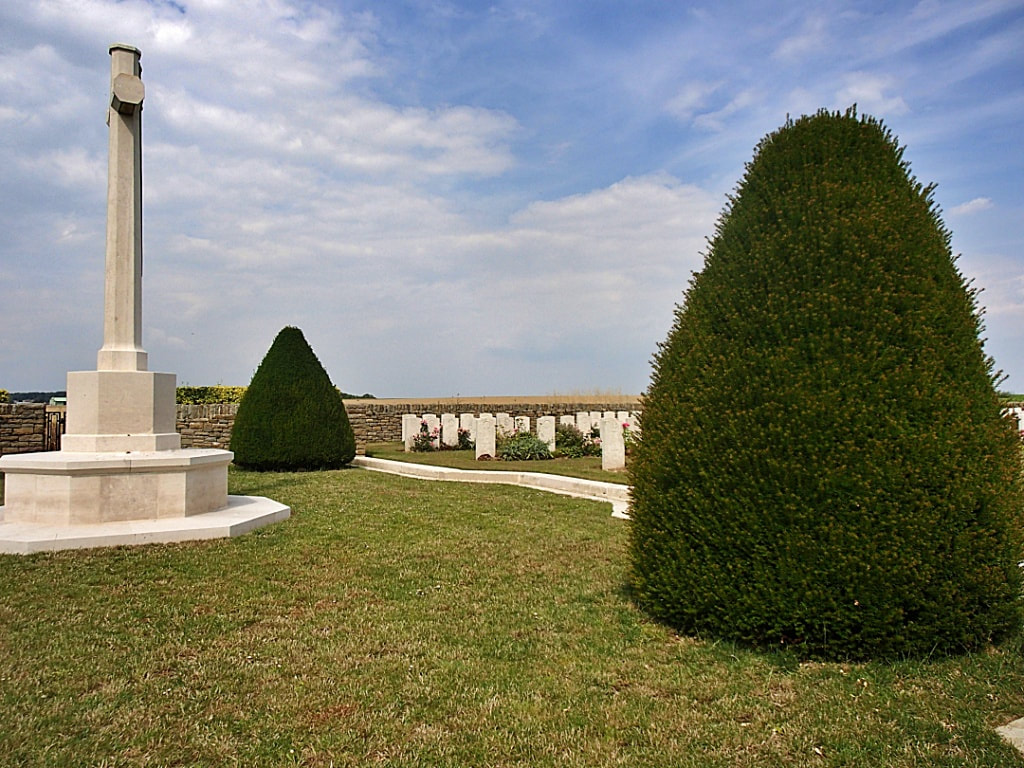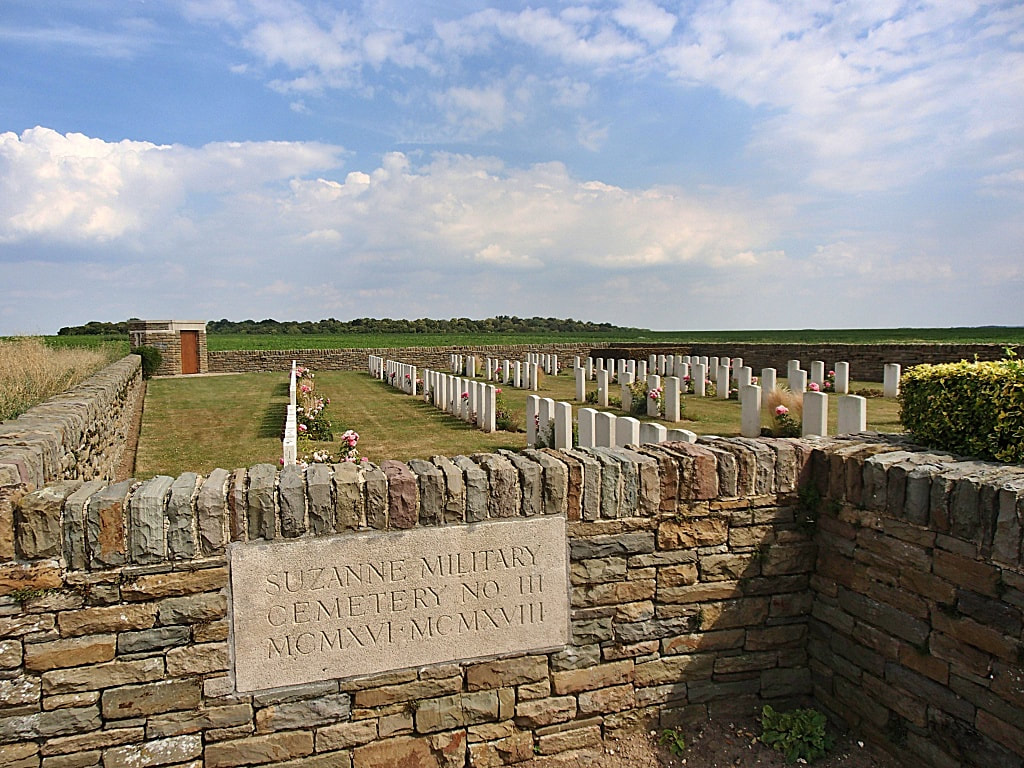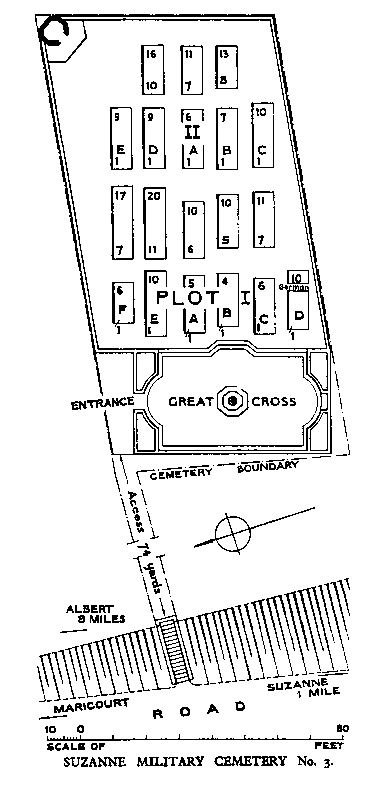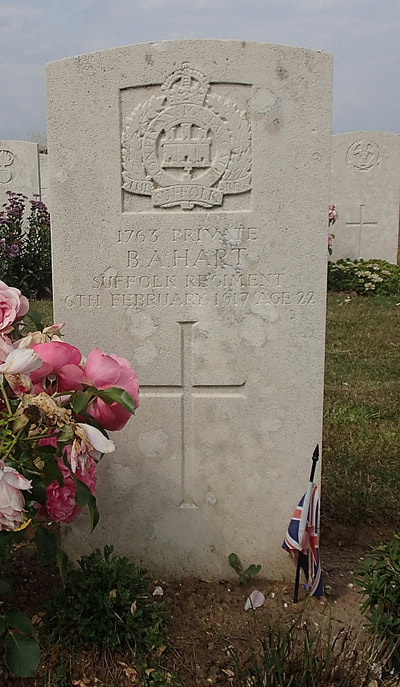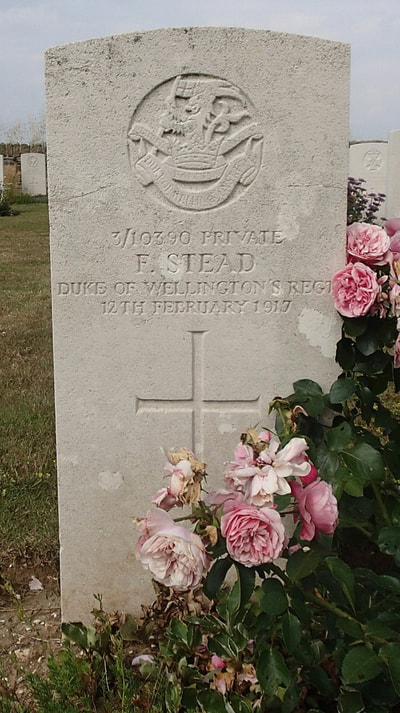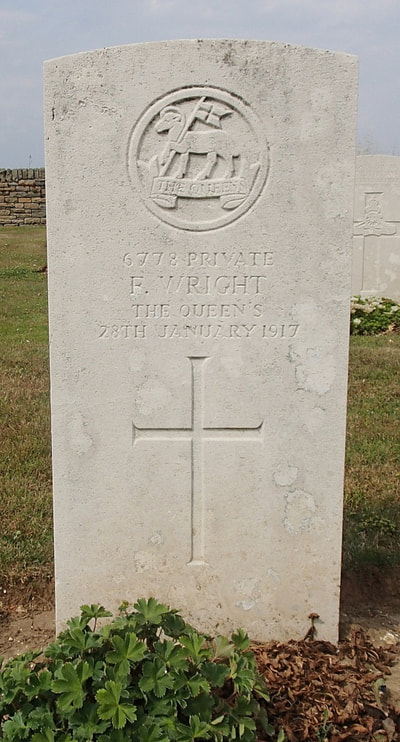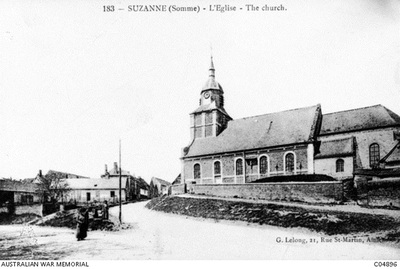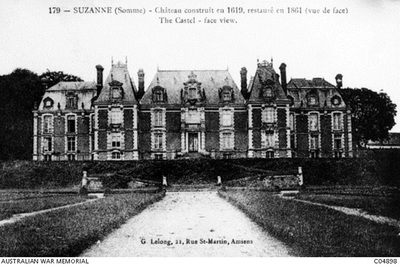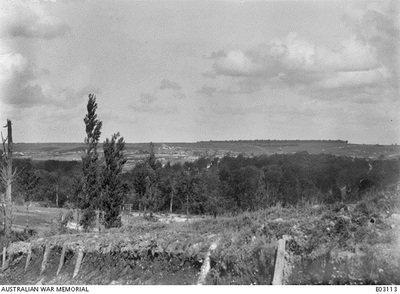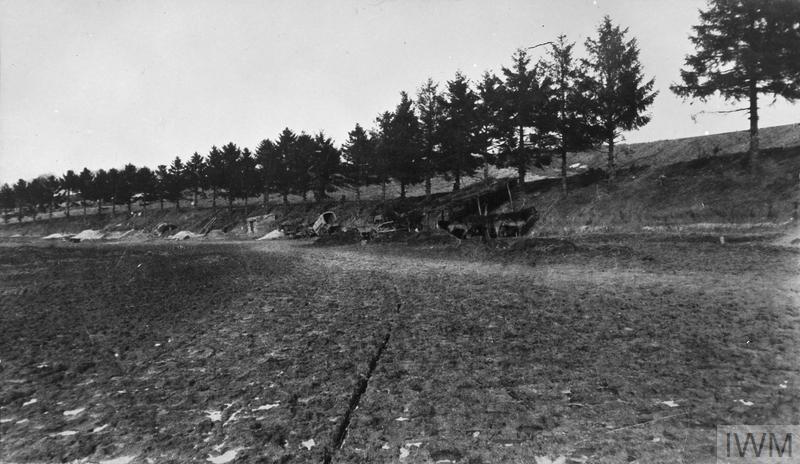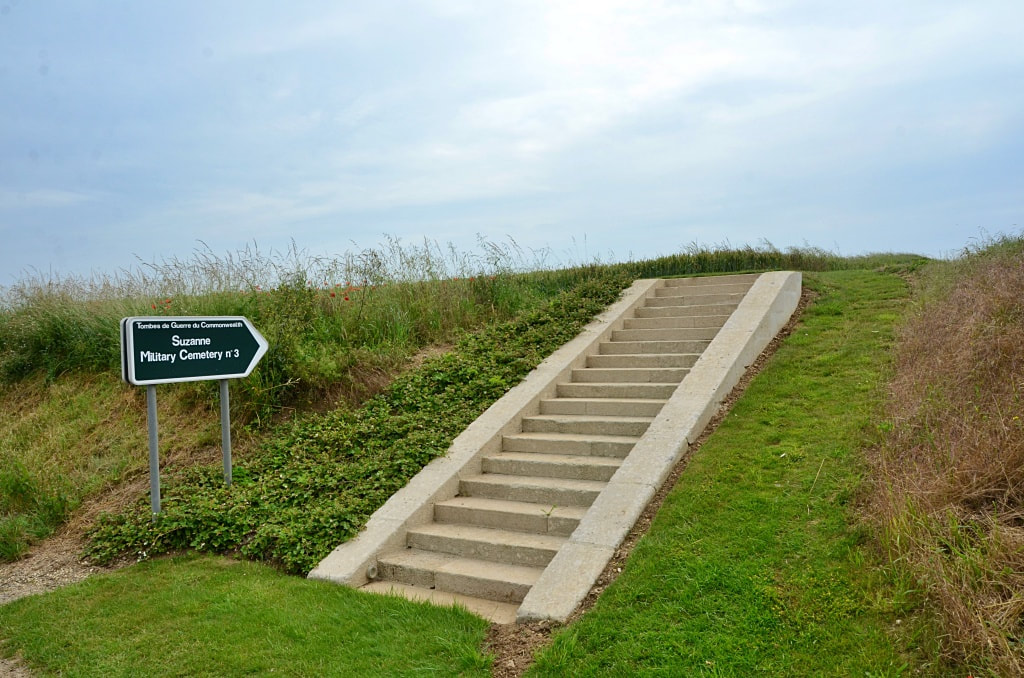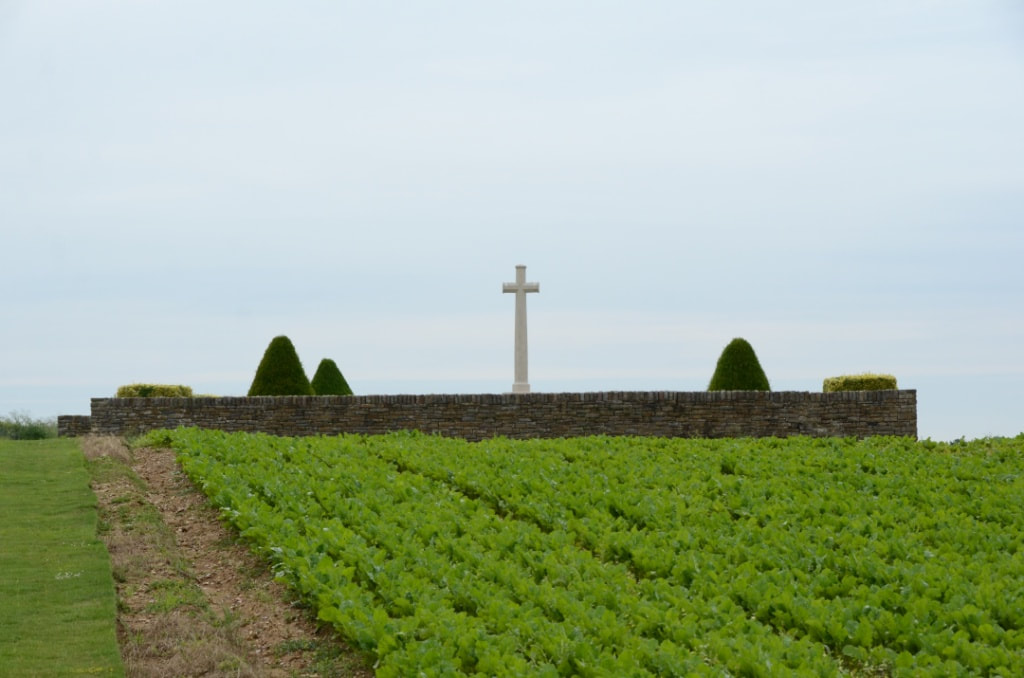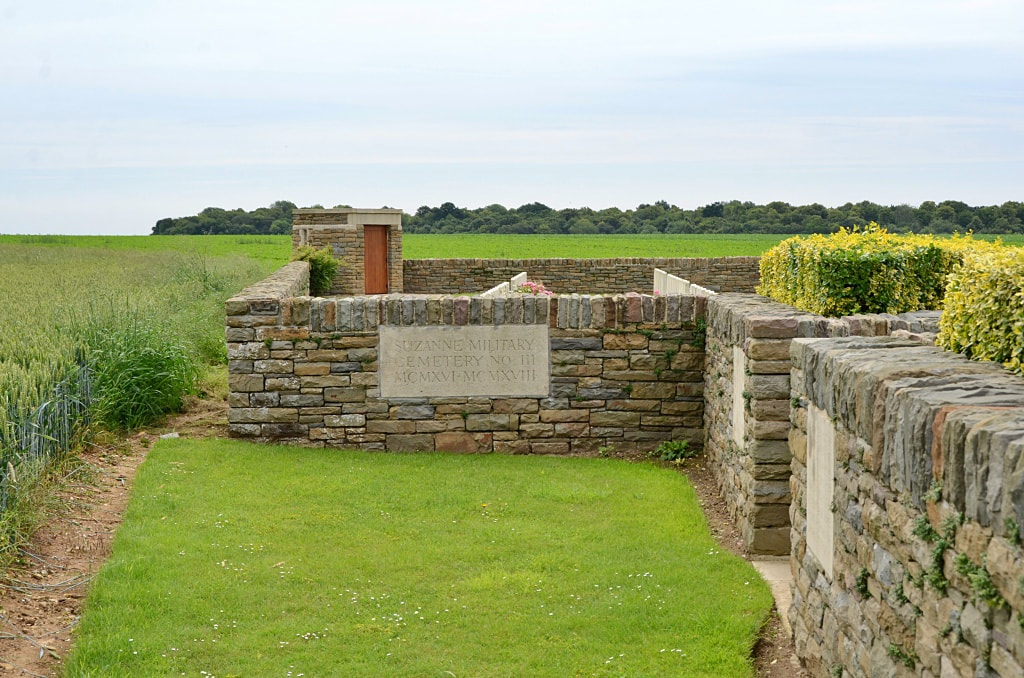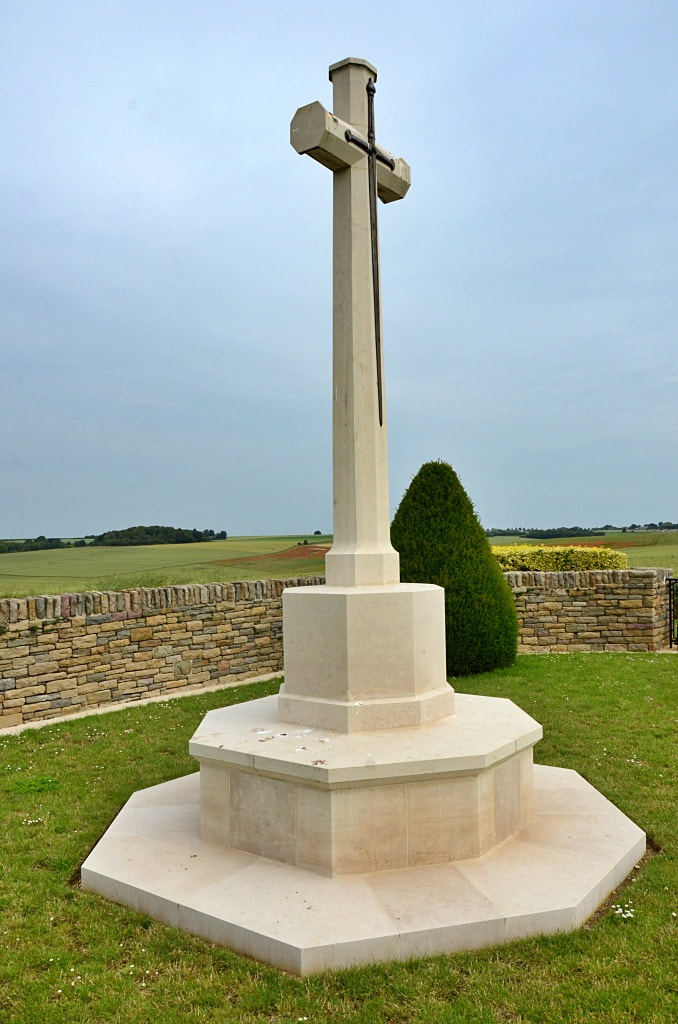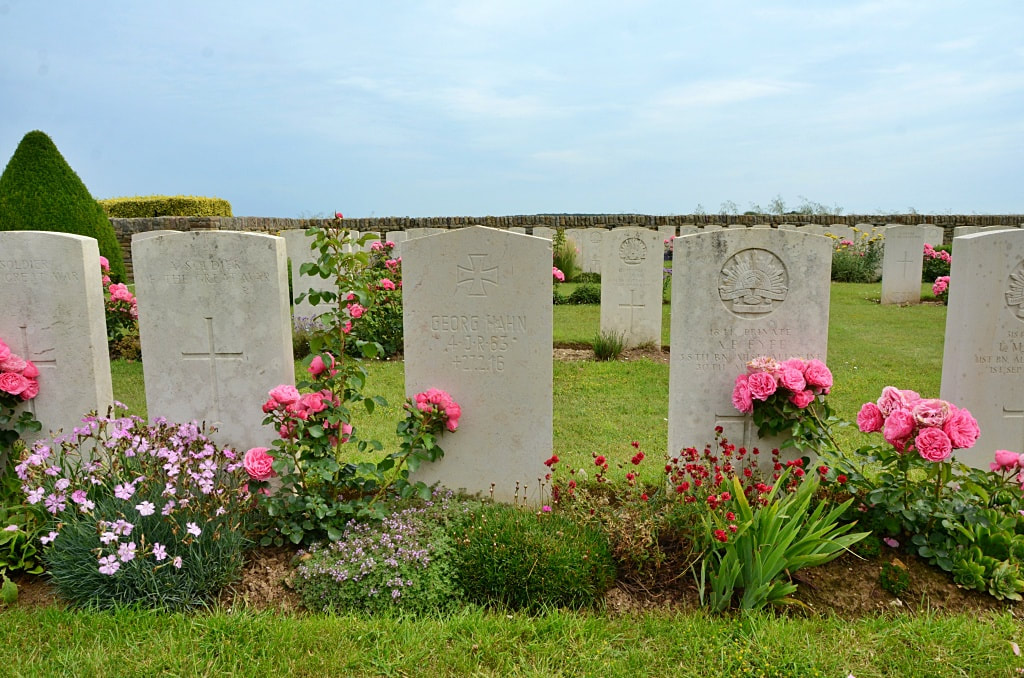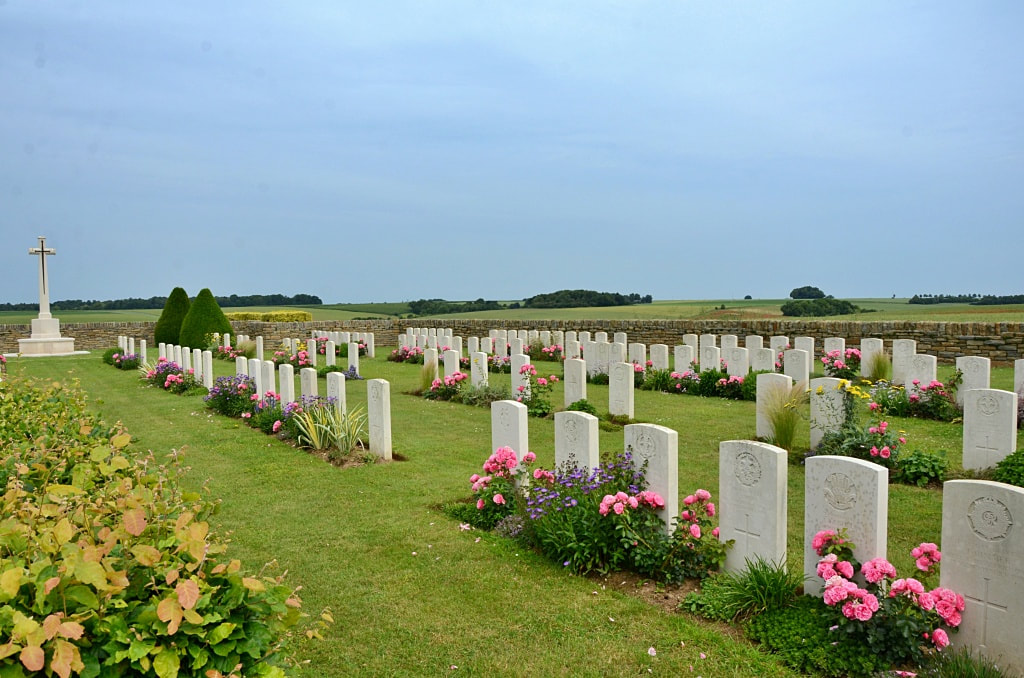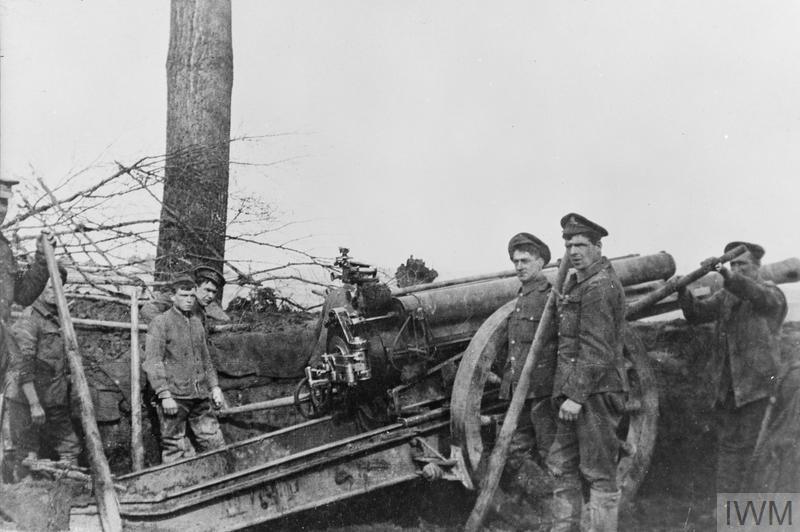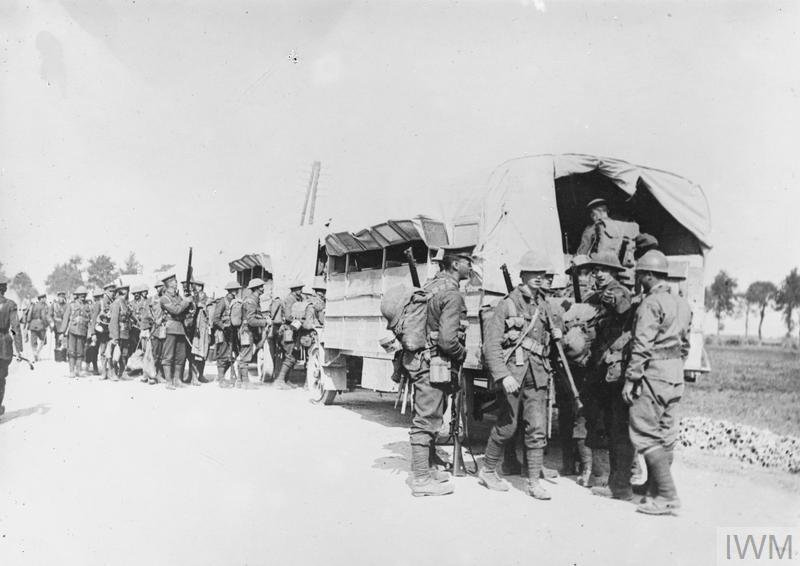SUZANNE MILITARY CEMETERY NO. 3
Somme
France
GPS Coordinates: Latitude: 49.96137, Longitude: 2.7772
Location Information
Suzanne is a village in the Department of the Somme on the right bank of the Somme River, about 13 kilometres south-east of Albert. Suzanne Military Cemetery No. 3 is north of the village near the east of the road to Maricourt.
Visiting Information
The location or design of this site make wheelchair access impossible.
Historical Information
The village of Suzanne was taken over by British troops in the summer of 1915, lost in March, 1918, and recaptured by the 3rd Australian Division on the following 26th August.
Suzanne Military Cemetery No. 3 was originally a French Cemetery (Cimetiere Mixte No. 3 de Suzanne); but after the Armistice the British graves were concentrated into it from the battlefields North of the Somme, and the French graves were removed.
There are now 138 Commonwealth burials of the 1914-18 war here. Of these, 42 are unidentified. There is also 1 German burial here.
The cemetery covers area of 925 square metres and is enclosed by a low rubble wall.
The cemetery was designed by Arthur James Scott Hutton
Total Burials: 139.
Identified Casualties: United Kingdom 67, Australia 26, Canada 3, Germany 1. Total 97.
Unidentified Casualties: United Kingdom 35, Canada 5, Australia 2. Total 42.
Suzanne is a village in the Department of the Somme on the right bank of the Somme River, about 13 kilometres south-east of Albert. Suzanne Military Cemetery No. 3 is north of the village near the east of the road to Maricourt.
Visiting Information
The location or design of this site make wheelchair access impossible.
Historical Information
The village of Suzanne was taken over by British troops in the summer of 1915, lost in March, 1918, and recaptured by the 3rd Australian Division on the following 26th August.
Suzanne Military Cemetery No. 3 was originally a French Cemetery (Cimetiere Mixte No. 3 de Suzanne); but after the Armistice the British graves were concentrated into it from the battlefields North of the Somme, and the French graves were removed.
There are now 138 Commonwealth burials of the 1914-18 war here. Of these, 42 are unidentified. There is also 1 German burial here.
The cemetery covers area of 925 square metres and is enclosed by a low rubble wall.
The cemetery was designed by Arthur James Scott Hutton
Total Burials: 139.
Identified Casualties: United Kingdom 67, Australia 26, Canada 3, Germany 1. Total 97.
Unidentified Casualties: United Kingdom 35, Canada 5, Australia 2. Total 42.
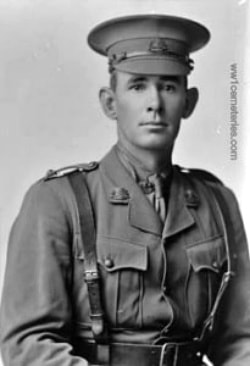
Lieutenant
James Adam
44th Bn. Australian Infantry, A. I. F.
26th August 1918.
Plot I. C. 3.
Son of John and Margaret Ellen Adam, of "Waanyarra", East Pingelly, Western Australia. Native of Kurting, Victoria, Australia.
James Adam
44th Bn. Australian Infantry, A. I. F.
26th August 1918.
Plot I. C. 3.
Son of John and Margaret Ellen Adam, of "Waanyarra", East Pingelly, Western Australia. Native of Kurting, Victoria, Australia.
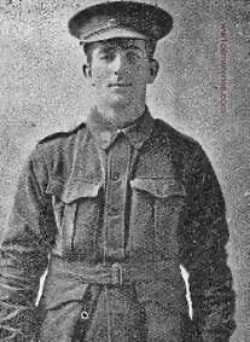
105 Private
Stanley Russell Armstrong
40th Bn. Australian Infantry, A. I. F.
1st September 1918, aged 25.
Plot I. E. 18.
Son of James and Frances Armstrong, of Elliott, Tasmania.
His headstone bears the inscription: "In Memory Of The Dearly Loved Son Of J. Armstrong Of Tasmania."
Stanley Russell Armstrong
40th Bn. Australian Infantry, A. I. F.
1st September 1918, aged 25.
Plot I. E. 18.
Son of James and Frances Armstrong, of Elliott, Tasmania.
His headstone bears the inscription: "In Memory Of The Dearly Loved Son Of J. Armstrong Of Tasmania."
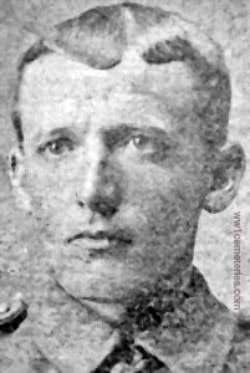
37849 Private
John Banfield
17th Bn. Welsh Regiment
10th February 1917.
Plot II. B. 12.
John Banfield
17th Bn. Welsh Regiment
10th February 1917.
Plot II. B. 12.
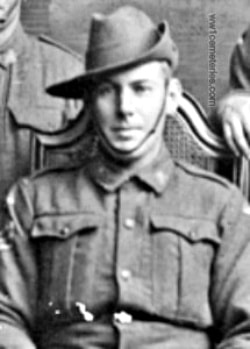
542 Sergeant
Oswald James Driscoll, Meritorious Service Medal
42nd Bn. Australian Infantry, A. I. F.
2nd September 1918.
Plot I. E. 10.
Oswald James Driscoll, Meritorious Service Medal
42nd Bn. Australian Infantry, A. I. F.
2nd September 1918.
Plot I. E. 10.
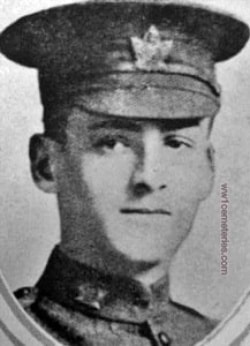
Second Lieutenant
Hamilton Carruthers Graham
London Regiment (Post Office Rifles)
26th August 1918, aged 20.
Plot II. B. 8.
Son of Annie Norton (formerly Graham), of 63, Horace St., Norwood Grove, Manitoba, and the late William Francis Graham. Native of Peterboro', Ontario.
His headstone bears the inscription: "Sleep On Beloved Son, Mother."
Hamilton Carruthers Graham
London Regiment (Post Office Rifles)
26th August 1918, aged 20.
Plot II. B. 8.
Son of Annie Norton (formerly Graham), of 63, Horace St., Norwood Grove, Manitoba, and the late William Francis Graham. Native of Peterboro', Ontario.
His headstone bears the inscription: "Sleep On Beloved Son, Mother."

76145 Gunner
Sidney John Keatley
128th Bty. 127th Bde. Royal Field Artillery
17th February 1917, aged 22.
Plot II. C. 4.
Son of Mr. and Mrs. A. Keatley, of 11, Kirkcowan Terrace, The Leys, Tamworth.
Sidney John Keatley
128th Bty. 127th Bde. Royal Field Artillery
17th February 1917, aged 22.
Plot II. C. 4.
Son of Mr. and Mrs. A. Keatley, of 11, Kirkcowan Terrace, The Leys, Tamworth.
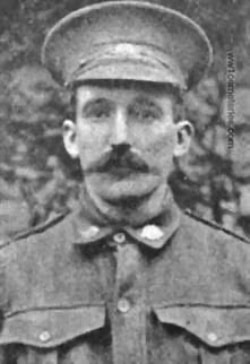
2113 Private
Harold Claude Loane
40th Bn. Australian Infantry, A. I. F.
30th August, 1918, aged 34.
Plot I. E. 15.
Son of the late Alexander Loane and of Sarah Bailey (formerly Loane), of Alberton West, Victoria, Australia. Native of Tasmania.
His headstone bears the inscription: "In Loving Memory Of Jack Son Of Mrs.Bailey, Victoria."
Harold Claude Loane
40th Bn. Australian Infantry, A. I. F.
30th August, 1918, aged 34.
Plot I. E. 15.
Son of the late Alexander Loane and of Sarah Bailey (formerly Loane), of Alberton West, Victoria, Australia. Native of Tasmania.
His headstone bears the inscription: "In Loving Memory Of Jack Son Of Mrs.Bailey, Victoria."
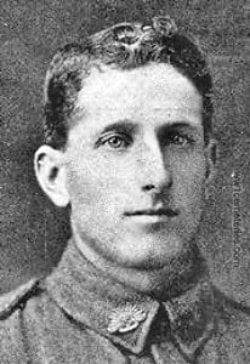
3552 Private
Walter James Lowe
40th Bn. Australian Infantry, A. I. F.
31st August, 1918, aged 28.
Plot I. E. 14.
Son of James Brackenridge Lowe and Lavina Lowe, of Quaker Hill, New South Wales. Native of Tasmania.
His headstone bears the inscription: "At Rest; He Died For Us And Gave His Life For Australia."
Walter James Lowe
40th Bn. Australian Infantry, A. I. F.
31st August, 1918, aged 28.
Plot I. E. 14.
Son of James Brackenridge Lowe and Lavina Lowe, of Quaker Hill, New South Wales. Native of Tasmania.
His headstone bears the inscription: "At Rest; He Died For Us And Gave His Life For Australia."
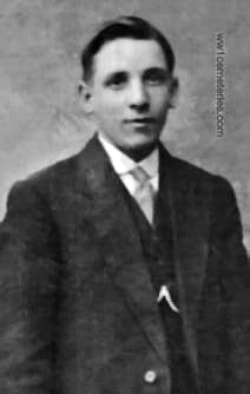
G/63009 Private
Noah John Lysons
Middlesex Regiment, posted to 7th Bn. London Regiment.
27th August 1918, aged 20.
Plot I. B. 1.
Noah John Lysons
Middlesex Regiment, posted to 7th Bn. London Regiment.
27th August 1918, aged 20.
Plot I. B. 1.
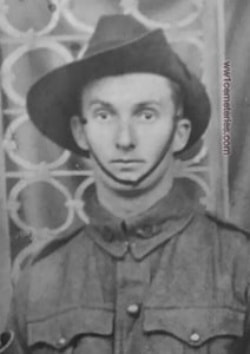
3635 Private
George Henry Maag
41st Bn. Australian Infantry, A. I. F.
1st September 1918.
Plot I. E. 6.
George Henry Maag
41st Bn. Australian Infantry, A. I. F.
1st September 1918.
Plot I. E. 6.
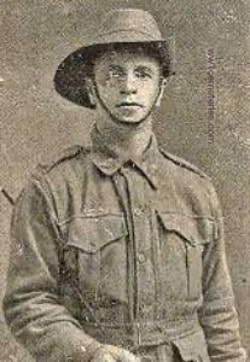
3359 Private
John Henry Martin
40th Bn. Australian Infantry, A. I. F.
30th August, 1918, aged 29.
Plot I. E. 13.
Son of James and Elizabeth A. Martin, of Warauh, Tasmania.
His headstone bears the inscription: "Until The Day Breaks And The Shadows Flee Away."
John Henry Martin
40th Bn. Australian Infantry, A. I. F.
30th August, 1918, aged 29.
Plot I. E. 13.
Son of James and Elizabeth A. Martin, of Warauh, Tasmania.
His headstone bears the inscription: "Until The Day Breaks And The Shadows Flee Away."
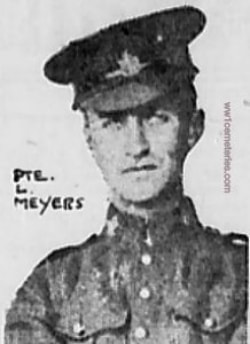
622293 Private
Lawrence G. Meyers
5th Bn. Canadian Infantry
27th September 1916, aged 25.
Plot II. D. 5.
Son of Mr. C. L. Meyers, of 6170, Roy St., Los Angeles, California, U.S.A.
Lawrence G. Meyers
5th Bn. Canadian Infantry
27th September 1916, aged 25.
Plot II. D. 5.
Son of Mr. C. L. Meyers, of 6170, Roy St., Los Angeles, California, U.S.A.
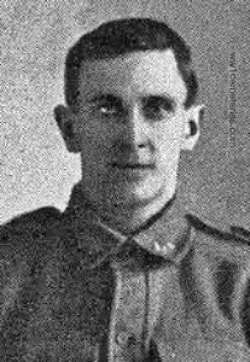
6134 Private
William Ernest Reynolds
17th Bn. Australian Infantry, A. I. F.
31st August 1918, aged 27.
Plot I. E. 8.
Son of William and Elizabeth Reynolds; husband of Ethel May Reynolds, of 10, Union Rd., Auburn, New South Wales.
William Ernest Reynolds
17th Bn. Australian Infantry, A. I. F.
31st August 1918, aged 27.
Plot I. E. 8.
Son of William and Elizabeth Reynolds; husband of Ethel May Reynolds, of 10, Union Rd., Auburn, New South Wales.
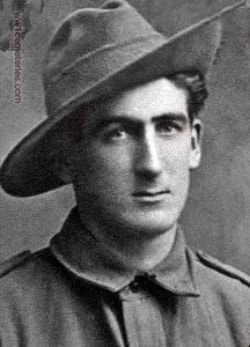
7366 Private
Hector Irving Sheeran
23rd Bn. Australian Infantry, A. I. F.
1st September 1918, aged 19.
Plot I. E. 5.
Son of Edward Thomas and Annie Sheeran. Native of Newport, Victoria, Australia.
Hector Irving Sheeran
23rd Bn. Australian Infantry, A. I. F.
1st September 1918, aged 19.
Plot I. E. 5.
Son of Edward Thomas and Annie Sheeran. Native of Newport, Victoria, Australia.

4863 Private
Maurice James Theobald
43rd Bn. Australian Infantry, A. I. F.
26th August 1918, aged 23.
Plot II. B. 2.
Son of Thomas and Maria Caroline Theobald, of Meadows, South Australia. Native of Adelaide. South Australia.
His headstone bears the inscription: "Until The Day Dawn And The Shadows Flee Away."
Maurice James Theobald
43rd Bn. Australian Infantry, A. I. F.
26th August 1918, aged 23.
Plot II. B. 2.
Son of Thomas and Maria Caroline Theobald, of Meadows, South Australia. Native of Adelaide. South Australia.
His headstone bears the inscription: "Until The Day Dawn And The Shadows Flee Away."

36539 Gunner
Harold Victor Walters
7th Bde. Australian Field Artillery
31st August 1918, aged 26.
Plot I. E. 11.
Son of Thomas and Harriet Walters, of "Astrea", Bank St., West End, Brisbane, Queensland.
His headstone bears the inscription: "No Morning Dawns No Night Returns But What We Think Of Thee."
Harold Victor Walters
7th Bde. Australian Field Artillery
31st August 1918, aged 26.
Plot I. E. 11.
Son of Thomas and Harriet Walters, of "Astrea", Bank St., West End, Brisbane, Queensland.
His headstone bears the inscription: "No Morning Dawns No Night Returns But What We Think Of Thee."
Shot at Dawn
1763 Private, Benjamin Albert Hart, 1st/4th Bn. Suffolk Regiment executed for desertion, 6th February 1917, aged 22. Plot I. C. 10. Son of Charles and Emma Hart, of 101, Fore St., Ipswich. A pre-War Territorial, he ran away from the line on several occasions: his unit served for many months on the Somme. After Hart had collected from various courts martial some 20 years or more of Penal Servitude (presumably suspended), a sympathetic officer — who considered Hart to be of low intelligence, unable to stand war — made him his servant so that he should not have to go in the line. But Hart ran away again. In due course he was executed, but only after considerable reluctance was shown over the supply of men to form the firing party. (Putkowski, p.161)
3/10390 Private Frederick Stead, 2nd Bn. Duke of Wellington's (West Riding Regiment), executed for desertion, 12th February 1917, aged 20. Plot II. C. 1. He enlisted in Dec 1913, & went to France late in 1914, his battalion being heavily engaged at Ypres. Stead was admitted to hospital in January 1915 with diarrhoea, but returned to duty 4 days later. However, he was soon to be hospitalised again, & evacuated to the UK, this time ’NYD’ (not yet diagnosed); being returned to France in late May 1916 before the Somme offensive. After 2 medical admissions (in turn, for debility & a broken ankle), Stead being returned each time to duty, he was thus in late July 1916 back with his unit at rest in the Ypres Salient. On October 10, he was treated for a gun-shot wound to the hand (probably self-inflicted), thus avoiding a day of action in which the battalion suffered 342 casualties.
A week later, Stead went absent, being tried & sentenced to death one month later. Despite commutation 3 weeks thereafter to a suspended sentence of 5 years’ Penal Servitude, he deserted the next day when under orders to move up the line. Stead was arrested 2 days before Christmas, whilst trying to escape from the controlled area behind the battle-front. Tried for a second time, he refused representation, remaining entirely silent during the proceedings. After the inevitable sentence, his CO stated that he had always performed his duties satisfactorily when in the trenches, & added that Stead was slightly backward. Accordingly, Stead was sent for examination by an Army neurologist, who however found 'no evidence of feeble-mindedness or mental defect’. Sentence was finally confirmed, the execution being the only one in the regiment throughout the war. (Putkowski,pp. 161-163)
6778 Private, Frederick Wright, 1st Bn. Queen's (Royal West Surrey Regiment), executed for desertion, 28th January 1917. Plot I. C. 7. Son of Mrs. Ellen Wright, of 249, East Street, Old Kent Road, London. He had served on the Somme throughout 1916, except for a brief period near Arras. (Putkowski,p.159)
1763 Private, Benjamin Albert Hart, 1st/4th Bn. Suffolk Regiment executed for desertion, 6th February 1917, aged 22. Plot I. C. 10. Son of Charles and Emma Hart, of 101, Fore St., Ipswich. A pre-War Territorial, he ran away from the line on several occasions: his unit served for many months on the Somme. After Hart had collected from various courts martial some 20 years or more of Penal Servitude (presumably suspended), a sympathetic officer — who considered Hart to be of low intelligence, unable to stand war — made him his servant so that he should not have to go in the line. But Hart ran away again. In due course he was executed, but only after considerable reluctance was shown over the supply of men to form the firing party. (Putkowski, p.161)
3/10390 Private Frederick Stead, 2nd Bn. Duke of Wellington's (West Riding Regiment), executed for desertion, 12th February 1917, aged 20. Plot II. C. 1. He enlisted in Dec 1913, & went to France late in 1914, his battalion being heavily engaged at Ypres. Stead was admitted to hospital in January 1915 with diarrhoea, but returned to duty 4 days later. However, he was soon to be hospitalised again, & evacuated to the UK, this time ’NYD’ (not yet diagnosed); being returned to France in late May 1916 before the Somme offensive. After 2 medical admissions (in turn, for debility & a broken ankle), Stead being returned each time to duty, he was thus in late July 1916 back with his unit at rest in the Ypres Salient. On October 10, he was treated for a gun-shot wound to the hand (probably self-inflicted), thus avoiding a day of action in which the battalion suffered 342 casualties.
A week later, Stead went absent, being tried & sentenced to death one month later. Despite commutation 3 weeks thereafter to a suspended sentence of 5 years’ Penal Servitude, he deserted the next day when under orders to move up the line. Stead was arrested 2 days before Christmas, whilst trying to escape from the controlled area behind the battle-front. Tried for a second time, he refused representation, remaining entirely silent during the proceedings. After the inevitable sentence, his CO stated that he had always performed his duties satisfactorily when in the trenches, & added that Stead was slightly backward. Accordingly, Stead was sent for examination by an Army neurologist, who however found 'no evidence of feeble-mindedness or mental defect’. Sentence was finally confirmed, the execution being the only one in the regiment throughout the war. (Putkowski,pp. 161-163)
6778 Private, Frederick Wright, 1st Bn. Queen's (Royal West Surrey Regiment), executed for desertion, 28th January 1917. Plot I. C. 7. Son of Mrs. Ellen Wright, of 249, East Street, Old Kent Road, London. He had served on the Somme throughout 1916, except for a brief period near Arras. (Putkowski,p.159)
Images in gallery below © Johan Pauwels
Nearby Cemeteries
Click to set custom HTML

